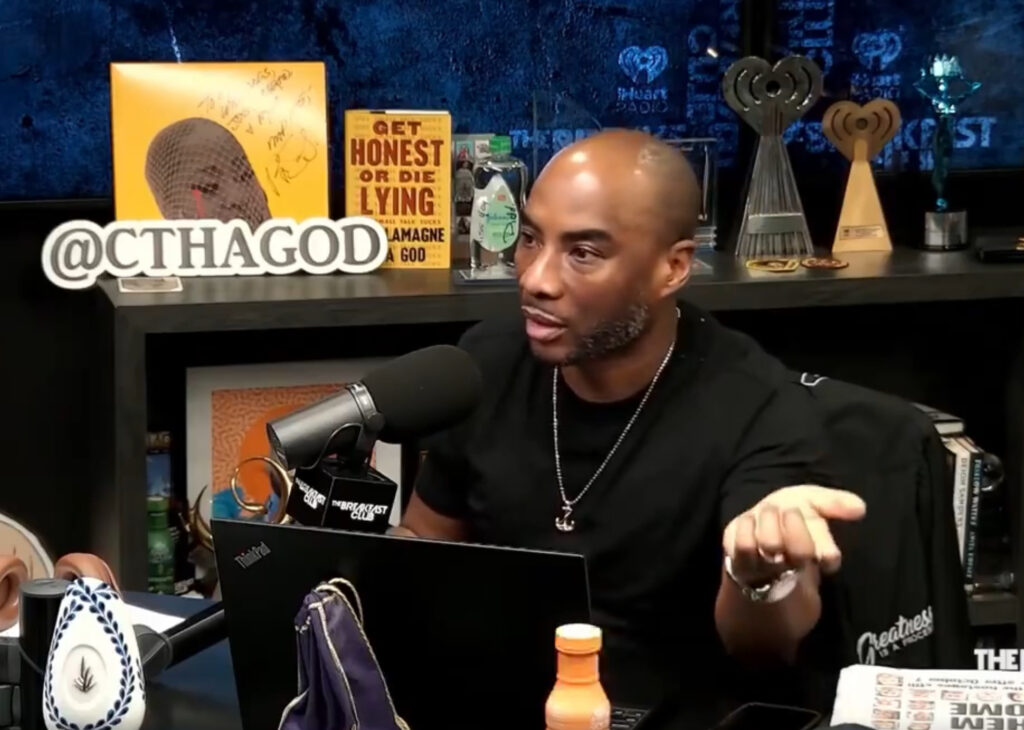In the ever-evolving landscape of American politics, sometimes insights emerge from unexpected quarters. Charlamagne Tha God, a well-known black radio host and co-host of the nationally syndicated radio show “The Breakfast Club,” played a notable role in the political arena during the 2020 presidential campaign. He became an advocate for then-candidate Joe Biden, pressing for the selection of a black woman as a running mate. Ultimately, this led to the selection of Kamala Harris, now the Vice President. However, Charlamagne’s recent commentary reveals a critical evaluation of the current state of the Democratic ticket for the 2024 elections, particularly emphasizing that Harris and her running mate, Minnesota Governor Tim Walz, are struggling to connect with American voters in the same impactful manner as former President Donald Trump and Republican Senator J.D. Vance of Ohio.
Charlamagne highlighted the effectiveness of the “America First” rhetoric employed by Trump and Vance during his show. According to him, their messaging resonates because it is rooted in addressing immediate concerns and issues faced by Americans. In stark contrast, Harris and Walz appear to focus on broader geopolitical topics rather than the pressing domestic affairs that voters care about. This divergence in messaging has contributed to a sense of disconnection between the Democratic ticket and everyday Americans, as Charlamagne articulated that the current administration’s responses often feel out of touch, especially during a critical election season.
The radio host pointed out how the questions posed to Walz skew toward international issues rather than local concerns, which can alienate voters looking for relatable and actionable solutions. He stated, “They messed up in regards to messaging,” and expressed concern that focusing on global matters detracts from addressing urgent domestic issues. His commentary reflects a broader frustration among many voters who feel neglected when their leaders emphasize foreign policies over pressing national crises.
An illustrative example from Charlamagne’s discussion was the Biden-Harris administration’s response to Hurricane Helene, after which humanitarian aid was announced for Lebanon while many in North Carolina were still reeling from the aftermath. This led to public outcry as citizens questioned the prioritization of foreign aid over local needs. Charlamagne emphasized that such situations highlight the potent appeal of the “America First” approach, as it resonates strongly with voters’ immediate concerns and needs, particularly during election seasons where connection and relatability can drive significant voter motivation.
Charlamagne’s role as a cultural commentator also includes his past interactions with Joe Biden, such as the infamous statement where Biden suggested that those undecided between him and Trump “ain’t black.” This moment drew heavy criticism but also underscored the complexities of Black voter sentiment in the 2020 campaign. Despite the controversies surrounding Biden’s gaffes, Charlamagne issued a demand for an enthusiastic black running mate, signaling that his support—and that of many voters—hinged on representation and the relevance of issues to the black community. This demand not only reflects the urgency of diverse representation in leadership positions but also serves as a reminder of the weight that identity politics carries in contemporary elections.
Charlamagne’s critical remarks serve as a sobering analysis of the current political landscape, where even his past support for Harris does not shield her from scrutiny regarding her campaign messaging. He admits that the “America First” narrative has a strong appeal among voters, pointing to the necessity for the Democratic Party to reassess its approach to engage effectively with the electorate. The acknowledgment from a previously supportive figure like Charlamagne points to a larger concern within the Democratic campaign, reinforcing that messaging that resonates with present-day realities is essential for garnering support, especially in a divisive political climate.
In conclusion, Charlamagne Tha God encapsulates a significant aspect of the current political discourse by recognizing the shortcomings of the Harris-Walz ticket in reaching voters. The past has shown that messaging—especially one that encapsulates a sense of pride and urgency, like “America First”—is a powerful tool in the political arena. As the 2024 elections approach, the Democratic Party faces the challenge not only of reevaluating its strategy but also of finding ways to resonate more deeply with the American populace. Charlamagne’s insights highlight the vital linkage between relatable messaging and voter engagement, reiterating the importance of addressing citizens’ immediate concerns while navigating the complexities of identity and representation in modern politics.

